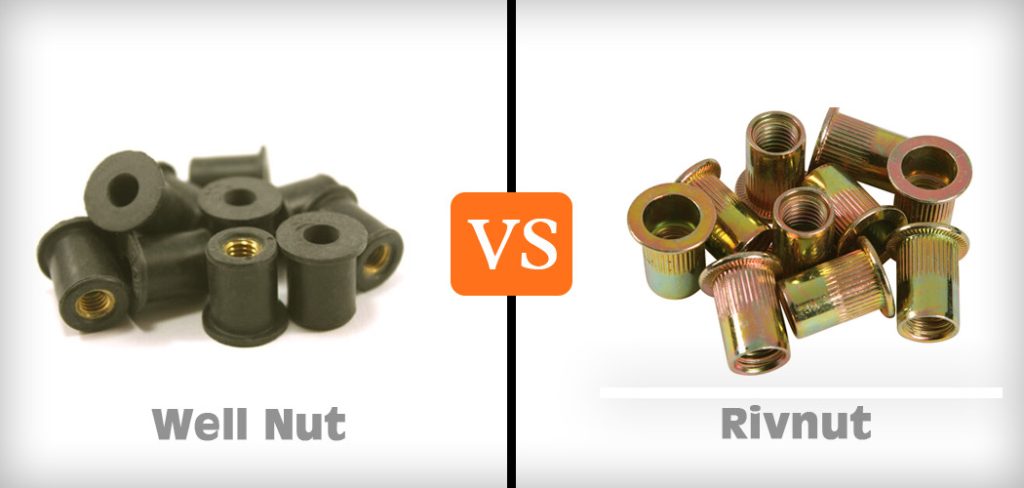There are many differences between Well nuts and Rivnuts, even though they may appear similar at first glance. Well nuts are typically used in a different range of applications than Rivnuts, so it’s essential to know the difference before choosing which one to use. For more detailed information, please read the article on the difference between well nut and Rivnut.

Table of Contents
What is Well Nut & Rivnut?
A Well nut is a type of fastener used to secure a bolt or screw in place. It is made up of a nut that is embedded in a rubber or plastic base. The Well nut is inserted into a hole that has been drilled into the material being fastened. The bolt or screw is then inserted into the Well nut and tightened.
Rivnut is a brand of fasteners used in a variety of applications. It is a tubular rivet with internal nut threads that can be installed in seconds from one side of the work. Once installed, no finishing work is required on the Rivnut. Rivnuts are made from steel, stainless steel, brass, and other materials and are not affected by heat.
Well Nut Vs Rivnut
There are several differences between Well nuts and Rivnuts, which help to distinguish them further. Below are some of these differences:
1. Different Called Name
Well Nuts are called Rub Nuts, Rubber Nuts or Rawl Nuts. Rivnuts are also called Blind Rivet Nuts or Rivet Nuts.
2. Waterproof
Well Nuts are waterproof (Marine Grade) and can be used in both wet and dry conditions, but Rivnuts are not waterproof.
3. Vibration Resistant
Well Nuts are vibration resistant and can be used in applications where there is a lot of movement or vibration. Rivnuts are not as resistant to vibration and should not be used in applications with a lot of exercise or vibration.
4. Material
Rivnuts are typically made of steel, Monel, or aluminum. A rubber-coated, internally threaded brass nut is ideal for use with a Well nut, as it provides a tight seal and prevents corrosion. Some well nuts are made only with hard-type rubber or plastic.
5. Stronger Pull-Out Strength
Rivnuts have a more muscular pull-out strength than Well Nuts. This means that Rivnuts can stay in place under tension better than Well Nuts.
6. Removed and Reused
Well Nuts can be removed and reused, but Rivnuts cannot be removed and reused. This is because the threads on Rivnuts are damaged when they are released.
7. Temperature Range
The temperature range for Well Nuts is -30°C to +80°C. The Rivnuts have a temperature range of -40 to +100 °C. If the temperature is hotter than usual, the strength of the rubber will decrease, which means the Well nut will be weaker.
8. Suitable for Use
Well nuts are used in many applications where water resistance is important, such as marine environments. They can also be used to help reduce vibrations and shocks in machinery. This makes them ideal for use in a wide array of industries, such as automotive and manufacturing.
9. Price
The price of a Well nut or Rivnut can vary depending on the size, material, and brand. However, a typical ¼” -20 thread well nut might cost around $0.80 to $1.00 each, and ¼” -20 thread Rivnut $0.25 to $0.40 each.
Which Should You Choose?
The Well Nuts and Rivnuts you use depend on what you will be using them for.
Well nuts are used in places where vibration and water are common, and can be installed easily using a drill bit of the same diameter as the Well nut. However, Rivnut should be used where high strength is required, as the power-holding capacity of Well nuts is much lower.
Rivnuts can be used where higher strength is required, but they can be a bit more complicated to install than well nuts. Besides, they should not be used when there are water and vibration problems. Although Rivnuts are more prone to rust than Well nuts, their strength-holding capacity is much lower than Rivnut.
The two nuts mentioned above may look similar, but their functions are quite different. If you’ve read the whole article, you should now understand the difference between the two and when each should be used.
Conclusion
I have highlighted the differences between Well nut and Rivnut based on sufficient research. I know much about their use because I have seen them use me. If you have a different opinion about them, please tell me through the comment box below.
Read More:
